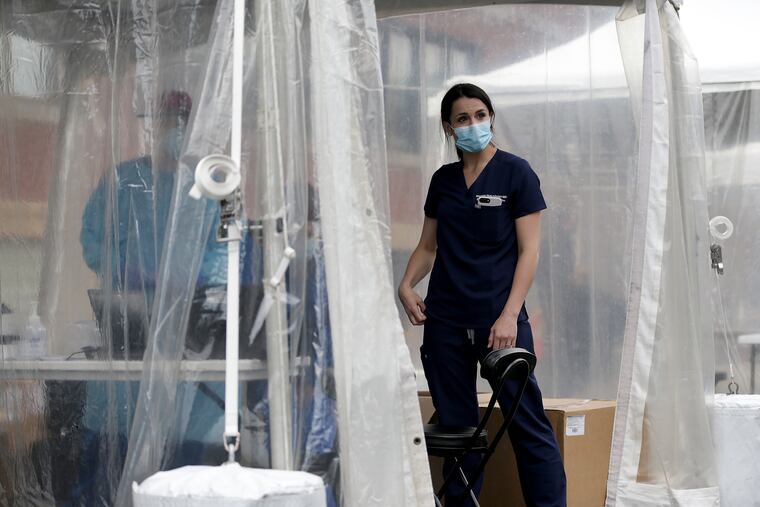‘It’s changed most of us forever’ | Coronavirus Newsletter
Plus, Pa.’s no-show rate for second shots is among the nation’s highest.

The gist: For health-care workers the waves of urgency and anxiety have crested, along with the coronavirus cases. But they say they are still living with an ebb and flow of emotion, that they are not yet in a position to join the rest of society’s return to normality, even as mostly mask-less throngs have returned to the beaches and boardwalks, and jobless claims have fallen to pre-pandemic lows.
What’s more, those who have been taking care of coronavirus patients say they are living with an underlying fear that it isn’t over, stoked by the spread of the Delta variant. Over a million Pennsylvanians haven’t had a second vaccine shot that they just might need to fend off the new threat.
— Anthony R. Wood (@woodt15, health@inquirer.com)
What you need to know:
🏥 A new law evidently is making it tougher for New Jersey nursing homes — already burdened by high costs and a tight labor market — to find staffing.
📚 For racial gaps in access to in-person learning last year, Pennsylvania and New Jersey were among the worst in the nation, a report says.
🎆 If it seemed as though 16 months of pent-up emotion burst forth on the Fourth of July, that might well have been the case in Philly. But in Washington, D.C., the U.S. Capitol was off-limits.
🏃♀️ With the opening ceremonies scheduled for July 23, Tokyo still is weighing limits on attendance at the Olympic Games.
💰 As further evidence that the economy is rebounding, U.S. jobless claims last week reached their lowest level since the pandemic started.
📰 What’s going on in your county or neighborhood? We organize recent coverage of the pandemic by local counties and Philly neighborhoods to make it easier for you to find info you care about. Sign up here to get those local headlines sent directly to your inbox on Tuesdays and Thursdays.
Local coronavirus numbers
📈The Inquirer and Spotlight PA are compiling geographic data on confirmed coronavirus cases, deaths caused by the virus, and vaccinations to curb the spread. Track the latest data here.
They use different terms to describe how the last 16 months have affected them: Trauma. Burnout. PTSD. It’s been hard on almost everyone, but the psychological ravages of the pandemic have extracted a particularly taxing toll on health-care workers. “I think it’s changed most of us forever or for a very long time,” said Carla LeCoin, a maternal-health nurse at Einstein Medical Center, “whether it’s how we practice, how we look at our upper management, how we look at the public, the government.” In the rush to confront the virus, health-care workers were buoyed by urgency and a sense of shared purpose. But its easing has left them with time to reflect on the death and sickness they witnessed, the anxieties of long hours and insufficient safety protections. Read more here about how the region’s health workers are coping.
Pennsylvania has one of the worst rates of full immunizations in the country, according to an Inquirer analysis, with more than one million state residents still needing a second shot. Health officials say the second shot might be a crucial defense against the Delta variant. Some countries have re-imposed lockdowns because of the spread of the Delta variant. By June 30, only 60% of Pennsylvanians had been fully vaccinated, meaning that many who received first doses in May skipped the second shots. The reasons so many are skipping or delaying second shots are unclear — particularly since Pennsylvanians have done better than many in other states at showing up for their first shots. Read more here.
Helpful resources
Going back to the office? Here are tips on easing anxiety at the workplace.
Allergy, flu, and cold symptoms can have some things in common. Here’s how to tell the difference.
I just had a vaccine shot. Is it OK if have a drink?
When the heat index hits 100, you can stay cool in Philly without air conditioning.
You got this: Growing home
The plants that sprout from a patch in deep South Phillly not only remind people of home — they taste like home, too. In this instance, many of the gardeners who are doing the growing happen to be refugees who were persecuted in their Asian homelands.
🚌 SEPTA is providing one way to beat the heat with cooling buses. Check out this cool video.
🤣 Who says humor isn’t ageless? At 89, this comedian is still standing, and leaving ‘em laughing.
🍧 Creamier than shaved iced, icier than Italian ice, here’s where to find the best water ice.
Have a social distancing tip or question to share? Let us know at health@inquirer.com and your input might be featured in a future edition of this newsletter.
What we’re paying attention to
In fighting COVID-19, “harm reduction” might make more sense and be more effective than draconian rules, argues this article in Scientific American.
They didn’t win a Super Bowl, but New York City held a ticker-tape parade Wednesday for health-care workers, reports the Wall Street Journal.
We might never know whether a lab leak in China was responsible for the pandemic. Kaiser Health News explores why.
Enjoy getting our journalism through email? You can also sign up for The Inquirer Morning Newsletter to get the latest news, features, investigations and more sent straight to your inbox each morning Sunday-Friday. Sign up here.